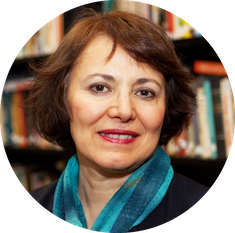Anthropologist and Professor Emerita at Concordia University
Homa Hoodfar is Professor of Anthropology, Emerita, at Concordia University, Montreal. Her field based research and expertise lies in legal anthropology; the anthropology of political economy; reproductive rights; Afghan women and youth refugees in Iran and Pakistan; women in formal and informal politics; hijab and clothing as political institutions; gender and citizenship; Muslim women’s sports as politics; and gender and the public sphere in Muslim contexts.
Describing herself as an academic in the service of civil society, Professor Hoodfar has also been actively involved in Research and Publication Division of Women Living Under Muslim Laws (WLUML) Network’s whose mission is to promote gender equality and plural democracy, since 1980s. Being imprisoned in Iran for her academic writings and charged with dabbling in feminism and security matters, in 2016, she has committed considerable effort in regenerating discussion on academic freedom as national and transnational rights in this era of research without border since her release.
Her publications include: Women’s Sport as Politics in Muslim Contexts WLUML(2015); Sexuality in Muslim Contexts: Restrictions and Resistance (edited with Anissa Hellie). London: Zed Books (2012); Electoral Politics: Making Quotas work for women London: WLUML (2011) (co-authored with Mona Tajali). The Muslim Veil in North America: issues and debates (Edited) with Sajida Alvi, and Sheila McDonough, Toronto: Canadian Scholars’ Press (2003). Between Marriage and the Market, Berkeley: University of California Press(1997); Shifting Boundaries in Marriage and Divorce in Muslim Communities (1996) (Special Dossier in Women and Law in the Muslim World Program), France: Women Living Under Muslim Laws (Edited Volume); Development, Change, and Gender in Cairo: A View from the Household. (1996) (edited with Diane Singerman) Indiana University Press; and numerous articles and chapters based on her different research projects.









